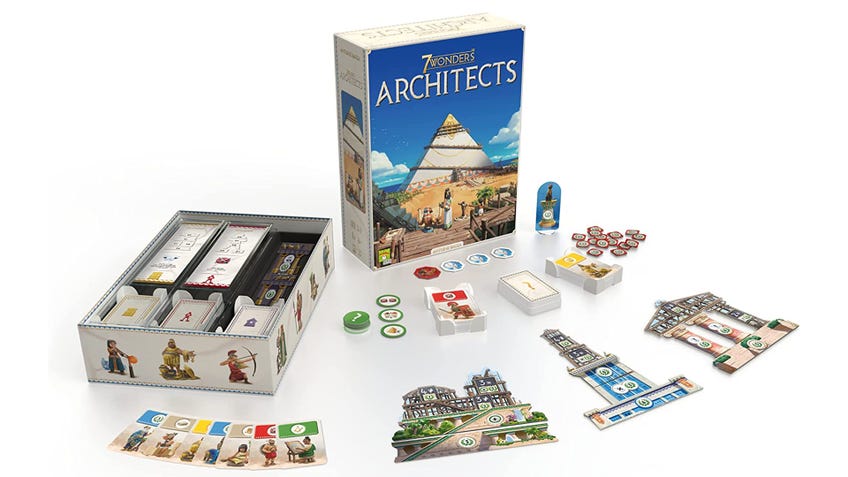7 Wonders: Architects fails to live up to the original game’s legacy
Best left forgotten.
I had entirely the wrong idea about 7 Wonders: Architects when it was first announced, thinking that it would be just a flashier version of the original 7 Wonders. How wrong I was. All the right iconography is there in Architects, from the ancient civilisations to the themes of war, legacy and progress, but there’s something fundamentally missing from the game that has always made 7 Wonders an absolute joy: the card drafting gameplay.
7 Wonders may be simple at its core, but the act of taking and playing cards is just the foundation for a much deeper experience that challenges players’ decision-making, whilst still incorporating a lot of random elements. Each round of the game sees players drafting cards from their hand, before passing that particular hand along to the player next to them and receiving a new one. Once all the players have chosen their cards, they reveal what they’ve taken and resolve the card’s effect.
Certain cards are incredibly simple – such as those that grant the player a resource/s – whilst others are a lot more complicated, sometimes requiring players to have certain resources or have already played a type of card. The important thing to note here is that the more complicated cards, which also give the better rewards, won’t usually be drafted until the later stages of the game, thereby allowing players to get to grips with the basics before tackling them.
7 Wonder’s massive potential for player interaction is what makes it so engaging and often times quite savage.
Deciding which cards to take will depend on what resources players currently have, which ones they can easily obtain and what benefits they get. Each civilisation in 7 Wonders specialises in creating a certain type of resource, such as clay or glass, and players can choose to pay their neighbours to use their resources if they need it to gain a card. This gameplay mechanic makes the act of physically drafting in-person work even better, as you can look to the left and right to see how your opponents could help. However, paying gold never feels good, especially when it’s to the people you’re competing against, forcing players to weigh up their options as much as possible.
Nevertheless, there will be cards in 7 Wonders that will feel impossible to resist, especially when they’ll help you take a big leap ahead in the competition– whether by gaining a load of victory points or by building more of your wonder – or if it prevents your opponents from taking it. This aspect especially comes into play whenever combat cards are involved, as preventing your neighbours from gaining them will help to protect your precious victory points at the end of the game.

The interplay between neighbours is really where 7 Wonders shines the brightest, as you’re able to somewhat even the odds by taking cards that the players sitting next to you want – thereby stopping those cards from being passed directly to them - or cards that they can help you get. 7 Wonder’s massive potential for player interaction is what makes it so engaging – and often times quite savage - which is why I love the game much as I do and why I don’t like Architects.
Architects isn't a more straightforward version of 7 Wonders, it misunderstands everything that makes the original so good.
Unlike 7 Wonders, Architects streamlines its card drafting gameplay to decks that are placed either side of each player, which they can choose to take from on their turn. If a player doesn’t want a card from either pile they can choose to take a facedown card from the deck in the middle of the table. Reducing 7 Wonder’s card drafting to this doesn’t make it any easier to learn – players are still just taking and playing cards - it just removes a lot of potential strategising that players can engage in. As the resource exchange element has been taken entirely out of Architects, taking certain cards doesn’t do much to affect your opponents beyond keeping them out of their hands. What’s more, as each player only takes cards when it’s their turn, it is often down to random chance – rather than player intervention - whether they’ll be able to take something good.
Cards are also simpler in Architects, with potential combos being reduced to finding the right types of resources or matching science cards. I don’t hate this as much as I dislike the new drafting mechanics, but it doesn’t help make the game any more enjoyable to play. Wonders are a lot easier to build in Architects due to the fact that they don’t require any particular combination of resources, rather just a certain number that either all match or all differ. This makes preventing your opponents from constructing their wonders almost impossible, further removing the ways in which players can interact.
All in all, Architects doesn’t come across as a more straightforward version of 7 Wonders with some extra bells and whistles – though I do like the components and the illustration – it feels like it misunderstands everything that makes the original so good. Without 7 Wonders’ drafting gameplay, Architects becomes another forgettable board game that piggybacks off a recognisable name but offers nothing in return. I think the legacy of 7 Wonders deserves better.


